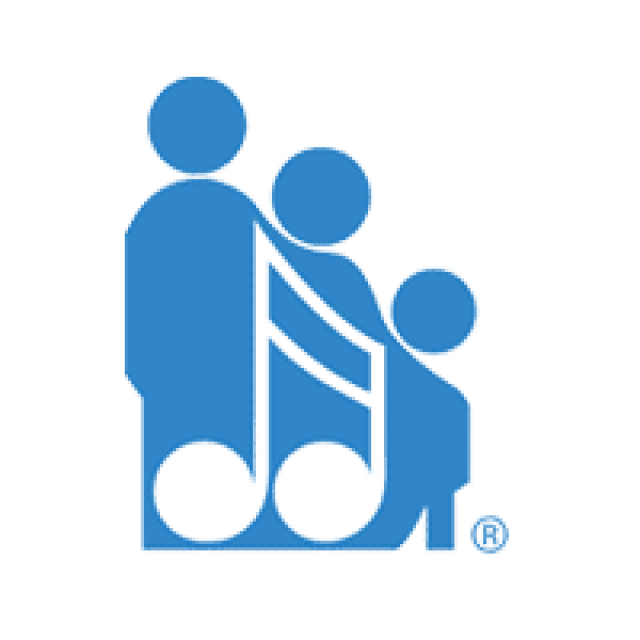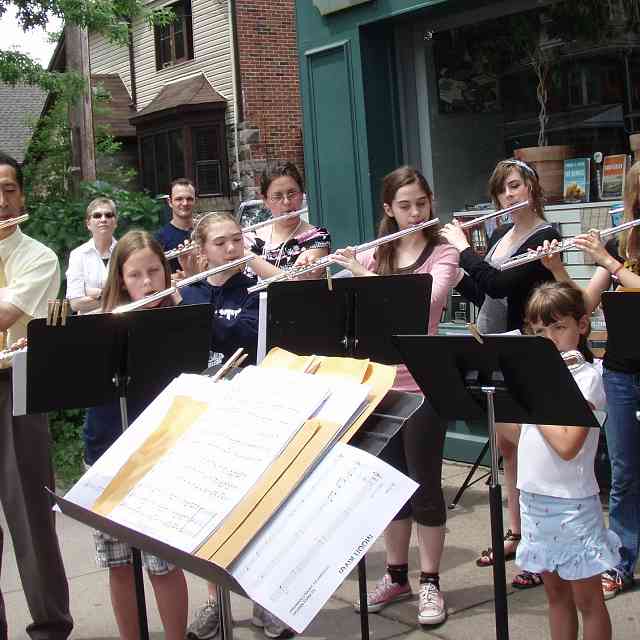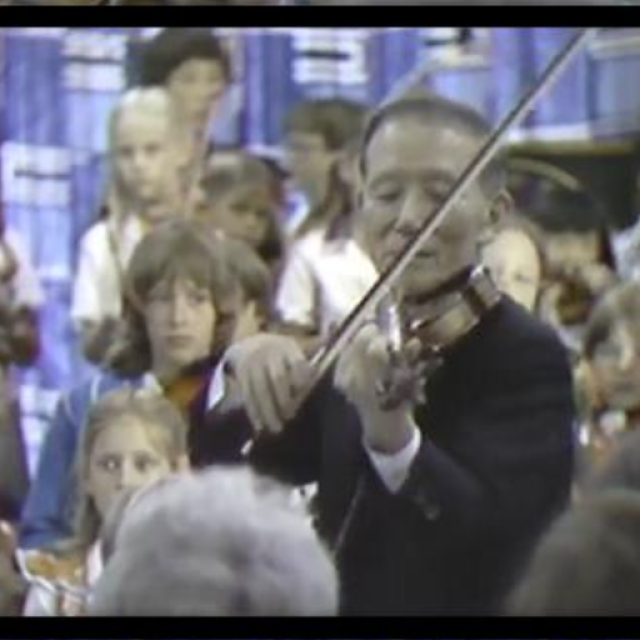A Report from a Micro Institute:
The Great Lakes Suzuki Flute Institute
By Kelly Williamson
At an institute directors’ meeting before the pandemic, I remember someone mentioning the concerns of “small institutes.” When it was our turn to speak, I stood up and said, “We are not just a small institute; we are a Micro Institute.” This is very true. Over the years, our institute has welcomed anywhere from two to sixteen students each year, and roughly a dozen teachers on average. Though we are small, we have made significant contributions to the larger Suzuki community. We are the only flute institute still in operation that has offered teacher training without interruption, aside from the blackout period during the pandemic. As noted in our responses to a recent SAA survey, the energy for those contributions has largely come from our own internal resources. At this time, these resources comprise a volunteer admin team of two teacher trainers—Meret Bitticks and myself—and two additional faculty members who are also teacher trainers, Noelle Perrin-Bryson and Wendy Stern.
As a tiny institute that exclusively serves one or two “small instrument areas,” we would like to share some exciting numbers from 2024 with the larger community, while acknowledging some of our continued challenges.
Here are the numbers:
31: The total number of individual teachers who took training courses at Great Lakes Institute this July.
30: The number of years since Great Lakes Institute was founded.
11: The number of attendees who received their training at our Latin American equivalency fee.
9: The total number of days the institute ran, not counting the online “welcome patio.”
8: The number of countries represented by our 2024 teacher participants, including our faculty and translators. These were Argentina (3), Canada (5), Colombia (2), Ecuador (3), México (2), Paraguay (1), Puerto Rico (1), and the United States (20).
7: The number of teachers who took two courses (ECC plus Unit 1, or Unit 2 plus Teaching Strategies).
6: The number of returning teachers who took advantage of our 30th-anniversary special rate of $300.
5: The number of student participants, three of whom returned from last year. They came from two countries/one state and two Canadian provinces/and four cities.
4: Faculty members.
2: Spanish interpreters; also the number of teachers who received support for their training from local chapter affiliates.
1: Teacher who received an SAA teacher training scholarship
(Can we have a round of applause?!)
In 1994, David Gerry founded the Great Lakes Suzuki Flute Institute in Hamilton, Ontario. Its mandate was primarily to provide Suzuki teacher training for flute teachers in Canada, since the travel, lodging, and currency exchange involved in attending US institutes were obstacles that many of us were not able to overcome. David hired a minimum of four flute faculty members so that he could offer multiple courses and varied observation opportunities, as well as attract a wider community of teachers. He offered tuition scholarships and assistance bursaries to many of us, insisting that inability to pay was not a reason not to come to the institute every year. We have done our best to continue this mandate.
I started attending Great Lakes in 1996, taking Book 1A with June Warhoftig. At that time, the institute was hosted in the basement of a church in Hamilton, Ontario. David collaborated with his dear friend and mentor, the late Mrs. Marie Lorcini, who brought her harp students and a number of harps. For some years, the collaboration with harp continued, with Delaine Fedson also attending the institute when she did her internship with David as a new teacher trainer. Room was frequently made for other cross-instrument collaborations, including violin siblings in group classes, or courses for recorder teachers. The institute community has always been a rich and diverse group, with in-person attendees from Bermuda, Perú, Taiwan, and Patagonia, as well as all parts of Canada and the US.
At the time that Great Lakes began, it was the only place in the whole country (Canada) where teachers and students could meet as a uniquely Suzuki flute community. There were several other choices for teachers in the United States, namely Stevens Point and East Tennessee State University, as well as Chicago and Washington, DC. Institut Suzuki Montréal started offering student activities, and occasional teacher courses shortly after I started my Suzuki training. Borealis Suzuki Institute, in Edmonton, Alberta, has also occasionally offered courses, as has the Alberta Suzuki String Institute.
Then came the pandemic, and Great Lakes Institute went online. As those who experienced that time will know, we had multiple drivers for doing this. As teacher trainers, we could not offer in-person courses, and all of us teachers were stuck at home taking advantage of the many online learning experiences available. This was a very rich period of growth for many of us. Among other workshop opportunities, I attended a number of talks about Indigenous thought and teachings in various parts of the world, which continue to influence my own teaching and training. But even more important to us was the consciousness that our Latin American Suzuki flute colleagues—already vastly underserved—now had no training opportunities at all.
We consulted with the Lima Suzuki Festival and inquired what rate they charged for teacher training courses, and determined that we would charge the same. However, many of our colleagues were either out of work or else had seen their savings slashed by responses to the economic stresses brought on by the pandemic. And yet they had time to come for courses. So we offered a package deal: Latin American teachers who enrolled in two or three courses saw a further modest reduction in their fees, and a few teachers who took a fourth course were offered free tuition for that course. One person received that offer and declined it, asking us to pass it on to someone else who needed it. Our goal was to help our Southern colleagues to “catch up” on the opportunities that we had been enjoying in the North, but which they were denied due to distance and language. As at Latin American festivals where the trainer did not speak the local language, our English-speaking trainers were supported by translators. Sometimes, these were volunteer supporters who donated their time. As time passed, we found that demand for our bilingual courses was only increasing as more people found out about them, and so we had to start offering a small honorarium for the service of translation. We tried to offer the opportunity to translate to colleagues in Latin America whose work had been impacted by the pandemic; only teachers who had already taken a course were eligible to audit it as a translator.
When we were able to resume in-person institutes, it was with some trepidation. Student numbers had been falling in the years before the pandemic, and teacher numbers had swelled in the initial stages of the pandemic. Would people be ready to come back in person?
2023 was our first year back, live in Paris, Ontario. We offered one hyflex course—Unit 2 with Teaching Strategies—for three in-person participants, and three remote participants. Three other courses plus ECC were offered online. In 2024, we again had a hyflex course, Unit 1, with only one in-person participant. Our principal goal has been to let the online participants see as much of the in-person institute as they can. We have streamed the group classes, informal solo student concert, and final concert, and recorded the outdoor community concert. As we hoped and expected, teachers are expressing interest in coming in-person when they are able, but we know that online training will be a must in the flute area until there is a teacher trainer within a commutable distance of every flute teacher in the Americas who is interested in Suzuki training.
Contributing to the development of those future trainers has been our number one goal. All four current faculty members were supported and mentored by David Gerry in becoming teacher trainers. We have been glad to pay that investment forward.
That said, it has been at a cost, mostly in administration hours that cannot be paid, but also by faculty who have sometimes taken a pay cut to keep the institute, as a whole, afloat. As the 2024 institute wraps up, we are looking for ways to get more support from the larger community with this noble endeavor! We need to revamp our website, directing teachers to apply for scholarships from SAA as a first resource for funding. This year saw our biggest success as far as teachers having access to courses. We have very enthusiastic and generous hosts for our in-person activities at St Paul’s United Church in Paris, Ontario. It was also our tightest year financially to date, despite those record numbers.
Another big challenge is cross-border travel. Since there is presently only one active flute trainer in Canada, bringing colleagues across the border for the institute is a necessity. Other Canadian institutes have consulted with lawyers and shared information which has been helpful, but not foolproof. This is an area where we could urgently use help and support from the SAA, since the latest update indicates that we will need to pay for short-term visas for each US instructor. Already hampered by high overheads, this is a daunting prospect.
Still, we are encouraged by the positive energy and feedback from attendees—both small and tall—and are looking forward to what the rest of the year will bring. Before the institute had even begun, we were fielding many requests for courses that we had not been able to offer in translation, and to book dates for the next Unit. With this level of joyful engagement, and so much work to be done, how could we pack it in?!
Dedicated in loving gratitude to David Gerry and his family—mother Lucy and brother Peter—for their constant and unwavering support.








